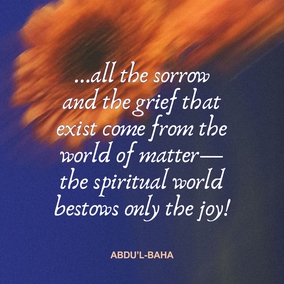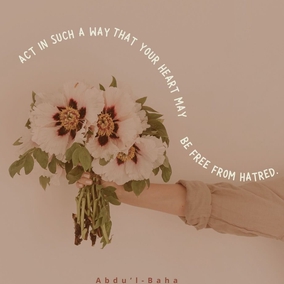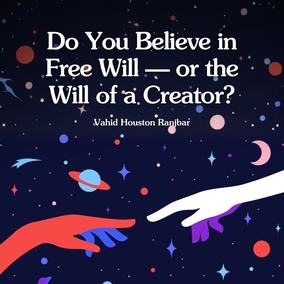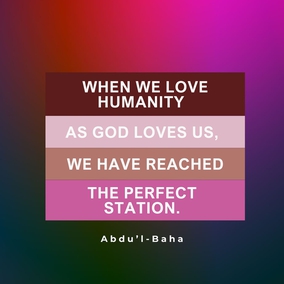The views expressed in our content reflect individual perspectives and do not represent the authoritative views of the Baha'i Faith.
I was intrigued by a profound statement from Abdu’l-Baha:
The reality of man is his thought, not his material body. The thought force and the animal force are partners. Although man is part of the animal creation, he possesses a power of thought superior to all other created beings. – Paris Talks, UK Baha’i Publishing Trust, 1972 eleventh edition reprint, p. 184.
This quote suggests a dynamic interplay between the material body and the power of thought. To me, it implies that thought represents a person’s inner reality, shaping beliefs, actions, and external experiences. At the same time, the material body serves as the vessel for expressing and manifesting those thoughts. I interpret this as showing how the two complement each other: the body enables action, and thought imbues those actions with creativity, purpose, and reflection—highlighting the integration of the physical and spiritual aspects of human existence.
The Vibrational Nature of Thoughts and Words
Thoughts are internal mental processes that arise in our minds, often through images, ideas, or emotions. They don’t always take verbal form and can exist as abstract concepts, feelings, or visual representations. For example, you might have an image or a vague sense of something without any specific words associated with it. Thoughts are a kind of mental raw material, shaped by experiences, sensory input, and subconscious reflections.
However, when we want to communicate or make sense of these thoughts, they need to be transformed into language. This transformation occurs when we organize our thoughts and express them through words. When thoughts are conveyed in words, they consist of sounds formed by vibrations created through the interaction of vowels and consonants.
From a scientific perspective, sound waves are physical vibrations that propagate through the air. These words, whether they arise from thoughts or are spoken directly, might generate internal frequencies that extend outward as vibrational patterns, potentially influencing the environment around us. For instance, the vocal tract’s movements during speech or singing produce air vibrations shaped by the tongue, lips, and vocal folds. These vibrations resonate at characteristic frequencies, amplifying and modulating sound. Thus, vibrations are tangible phenomena capable of influencing both the speaker and the environment (Kinsler et al., 2000).
Scientific and philosophical perspectives both explore vibrations as a unifying force. Neural activity in the brain generates measurable waves—alpha, beta, and gamma—corresponding to various mental and emotional states. This supports the idea that thoughts, though intangible, have physical impacts, influencing both the brain and emotional responses (PLOS, 2020; PLOS ONE, 2020).
Additionally, resonance theory suggests that shared vibrational frequencies foster interconnectedness, enabling self-organization and cooperation within systems. This extends to the material realm, where vibrations influence the structure and behavior of matter, such as in crystal formation or cymatics experiments (NeuroLaunch, 2020; PLOS Computational Biology, 2020).
Thoughts can also be expressed through images, music, dance, and other creative forms. Artists often translate their internal thoughts into visual representations. Musicians convey feelings or ideas through melodies and rhythms. Dancers express emotions or stories through movement. In these ways, thoughts are not limited to language—they can be shared through a multitude of expressive mediums, each offering a unique window into the inner world of the creator.
Abdu’l-Baha states:
In man there are two natures; his spiritual or higher nature and his material or lower nature. In one he approaches God, in the other he lives for the world alone. Signs of both these natures are to be found in men. – Paris Talks, p. 72.
Upon reflection, I have come to perceive thoughts as a connection between our two natures. They can arise from our higher, spiritual self—guiding us toward noble goals, compassion, and selflessness—or from our lower, material self, which may draw us toward worldly desires.
Grasping these dual aspects motivates me to investigate how thoughts, words, and actions can better align with our spiritual essence. For instance, when I pay attention to my thoughts and their sources, I realize that some thought patterns elevate my spirit and provide clarity, while others anchor me to trivial concerns or negativity.
The Power of Inner Narratives
Examining the thoughts behind feelings like anger and sadness—often viewed negatively—can act as a powerful tool for self-exploration and growth. These emotions frequently signal unmet needs, unresolved issues, or deeper yearnings for transformation, connection, or justice. They also reflect narratives we consider to be true about ourselves.
These narratives—thoughts we construct about our identity, worth, or the world—are shaped by our experiences and perceptions. For example, repeatedly thinking “I am unworthy” can evolve into a story of constant self-doubt. In contrast, thinking “I can overcome challenges” supports a narrative of resilience and growth.
These narratives, conscious or not, wield tremendous influence. A thought like “I was treated unjustly” may provoke anger; “I have lost something valuable” may evoke sadness.
Acknowledging that stories are essentially thoughts gives us the power to question and redefine them. Recognizing the narratives that guide us, we can choose to reshape them—releasing limiting beliefs and replacing them with more empowering, balanced perspectives. This process allows us to transform our emotional experiences, fostering greater peace, joy, and resilience.
Disempowering Actions
From a spiritual perspective, Baha’u’llah emphasizes our noble nature:
Noble have I created thee, yet thou hast abased thyself. Rise then unto that for which thou wast created. – The Hidden Words, Arabic no. 22.
Negative words, often associated with low frequencies, can perpetuate harmful experiences. Positive and uplifting speech, on the other hand, enhances well-being and aligns us with higher spiritual realities.
The Baha’i teachings caution against actions that dim our inner light. For example:
Backbiting quencheth the light of the heart, and extinguisheth the life of the soul. – The Kitab-i-Iqan, p. 193.
Breathe not the sins of others so long as thou art thyself a sinner. – The Hidden Words, Arabic no. 27.
And:
Confession before the servants (i.e., before men) is not permissible, for it is not the means or the cause of Divine Forgiveness… The sinner must, between himself and God, beg for mercy from the Sea of Mercy and implore pardon from the Heaven of Forgiveness. – Baha’u’llah, Glad Tidings, Tablets of Baha’u’llah, p. 84–85.
These teachings show that negative thoughts and words disempower us spiritually and socially. Harmful speech, like backbiting and judgment, affects not only our own spiritual condition but also how others perceive and respond to us.
Even when a person sincerely changes, others may still view them through the lens of past actions, making it harder to be seen in the light of who they are becoming.
Scientific Insights: Words and the Brain
Negative words (fear, anger, sadness) activate the amygdala, the brain’s threat center, triggering a stress response. Studies by Kanske et al. (2011) and Canli et al. (2002) confirm this effect.
Positive words (joy, motivation, love) activate the prefrontal cortex and ventral striatum—regions linked to decision-making, reward, and emotional well-being. Research by Knutson et al. (2001) and Federico et al. (2007) shows that such words enhance motivation and emotional resilience.
Anchoring in Spiritual Practices
By turning inward, we cultivate virtues like trustworthiness, truthfulness, and purity of heart. Baha’u’llah emphasizes:
The virtues and attributes pertaining unto God are all evident and manifest… patience, nay, thankfulness in the midst of tribulation, and complete reliance, in all circumstances, upon Him. – Gleanings from the Writings of Baha’u’llah, p. 290.
Through mindfulness and prayer, we align with divine virtues and co-create a reality that uplifts both ourselves and those around us. As Abdu’l-Baha states:
All physical perfections come to an end; but the divine virtues are infinite. – Divine Philosophy, p. 137.
Love the creatures for the sake of God and not for themselves… Look toward God, you will love them and be kind to them… Therefore, do not look at the shortcomings of anybody; see with the sight of forgiveness… You must love and be kind to everybody, care for the poor, protect the weak, heal the sick, teach and educate the ignorant. – Abdu’l-Baha.
This passage reminds us that perceived flaws in others may stem from our own limited perception. Abdu’l-Baha calls us to see with the “eye of forgiveness,” recognizing the divine spark in each soul.
By fostering positive thoughts and words, we activate the transformative power of divine attributes—love, kindness, justice—and begin to shape a reality that reflects the highest potential of the human spirit.
O friends! Be not careless of the virtues with which ye have been endowed, neither be neglectful of your high destiny. – Baha’u’llah, Gleanings from the Writings of Baha’u’llah, p. 196.
The virtues and attributes pertaining unto God… rank, according to the estimate of God, among the highest and most laudable of all acts. All other acts are… subordinate unto them. – Baha’u’llah, Gleanings from the Writings of Baha’u’llah, p. 290.
As for the spiritual perfections, they are man’s birthright and belong to him alone of all creation. – Abdu’l-Baha, Paris Talks, p. 72.















Comments
Sign in or create an account
Continue with Googleor